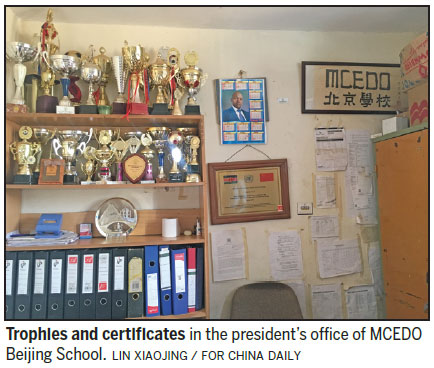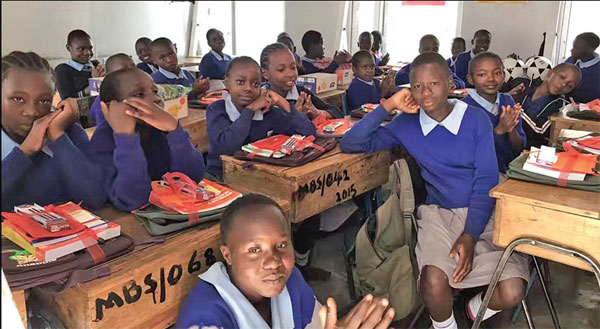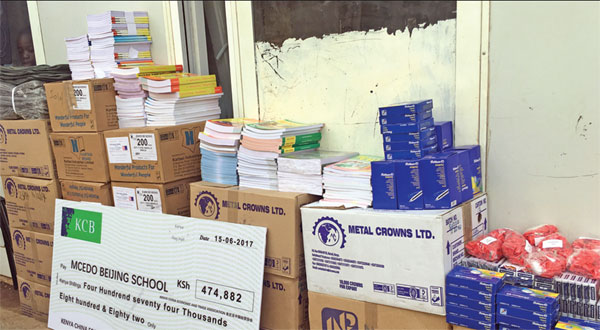Classroom is like an oasis

With Chinese assistance, Kenya is constructing schools, roads and railways to build better lives
It was an early morning in June in Narobi, Kenya's capital, when our car drove from the clean and prosperous city center and, finally, onto a bumpy and dusty road. The scene outside the window was also different by then, with plastic bags and household garbage strewn here and there.
We were visiting Mathare Slum, the second-largest slum in Nairobi and also one of the oldest in Kenya. The slum, a short drive from the city center of Nairobi, is home to more than 500,000 people, who do not have proper access to such basic daily requirements as water, electricity and toilets.
As soon as the car stopped at the MCEDO Beijing School, curious children came toward us.
| Students of MCEDO Beijing School show their new stationery and books that were donated by Chinese companies. Luo Zicheng / For China Daily |
| Stationery donated by the China-Kenya business associations. Zhang Lei / For China Daily |
When built in 2001, the primary school, then known as MCEDO Primary School, was very shabby. In 2006, with a donation to Kenya from China's embassy, a new building was constructed. In gratitude for the embassy's support, the school changed its name to MCEDO Beijing School.
China's embassy in Kenya has been watching the development of the school. In 2012, with an increase in the number of students, the school lacked enough education resources and space, so China's embassy called on Chinese companies in Kenya to donate about 4 million yuan ($597,000) to expand the school. Right now, more than 600 students study there, most of them from poor families and many from one-parent families. Some are orphans.
In Kenya, Chinese companies construct roads, bridges and railways, which support Kenya's economic and social development in many aspects. Moreover, companies also enter the communities to help satisfy their basic needs, and MCEDO Beijing School is one example of this.
This time, China's embassy in Kenya and China-Kenya business associations visited MCEDO Beijing School to send books and stationery.
There are four buildings in the school, two of which are new. The school building I saw was a white, two-story building. On the walls of the classrooms are maps and colorful paintings. On the blackboard, which is actually a whole wall painted black, there are some Kiswahili words. Students' desks and chairs are wooden, and they put school bags on the backs of the chairs.
The children were very excited even before the donation activity began. Students in the higher grades stood in the aisle of the second floor, watching what was happening downstairs. On the first floor, some boys were looking at soccer balls that we had brought.
I walked into a classroom, trying to talk with them. I was kind of worried that they would shut me out. Instead, they soon sang a song, Jambo, for me in Kiswahili, clapping their hands and dancing, and rushed to introduce themselves to me.
When these children finally got stationery from the hands of the counselor of the embassy and the entrepreneurs, they burst into big smiles. For them, the stationery carries their desire for knowledge and the future.
The children also sang and danced for all of the Chinese guests, with the space becoming their stage and playground. The drumbeats, singing and laughter inspired us, and we followed their steps to dance. For one moment, I felt I was in a paradise, despite the slum that was just meters away.
"My favorite classes are math, and I like playing soccer," said Michael, 10, who is the fourth child in his family, which sells newspapers and snacks for income.
"I want to become a soccer player like Lionel Messi," he added.
Bright-eyed Jeffery, 9, was a bit shy in front of my camera. He said he heard about China in his class.
"When I grow up, I want to visit Beijing," he said.
When we were about to leave, the children came out, posed for photos with us and waved goodbye. On my way back, the girls' singing "Jambo...Jambo sana ..." lingered in my mind. Compared with the materials that we brought to them, perhaps the pure and touching feelings they brought to us were more precious.
A child cannot decide their own birth or country or what kind of family to be born into. But every kid has the equal right to receive an education and enjoy childhood. Education is their key to eradicating poverty.
A primary school may not totally change the life of children in the slum, but it is still like an oasis in a desert that will help the children develop and grow.
The author is an officer at the Economic and Commercial Counselor's Office of the embassy of China in Kenya.
For China Daily
| Officials from the Chinese embassy in Kenya and enterprise representatives with students at the donation ceremony. Chen Cheng / Xinhua |


(China Daily Africa Weekly 08/11/2017 page21)
Today's Top News
- Foreign ministers of China, Egypt call for Gaza progress
- Shield machine achieves Yangtze tunnel milestone
- Expanding domestic demand a strategic move to sustain high-quality development
- Xi hears report from Macao SAR chief executive
- Xi hears report from HKSAR chief executive
- UN envoy calls on Japan to retract Taiwan comments

































